Unit 1 How often do you exercise? Section B 精讲及试题[上学期]
文档属性
| 名称 | Unit 1 How often do you exercise? Section B 精讲及试题[上学期] |
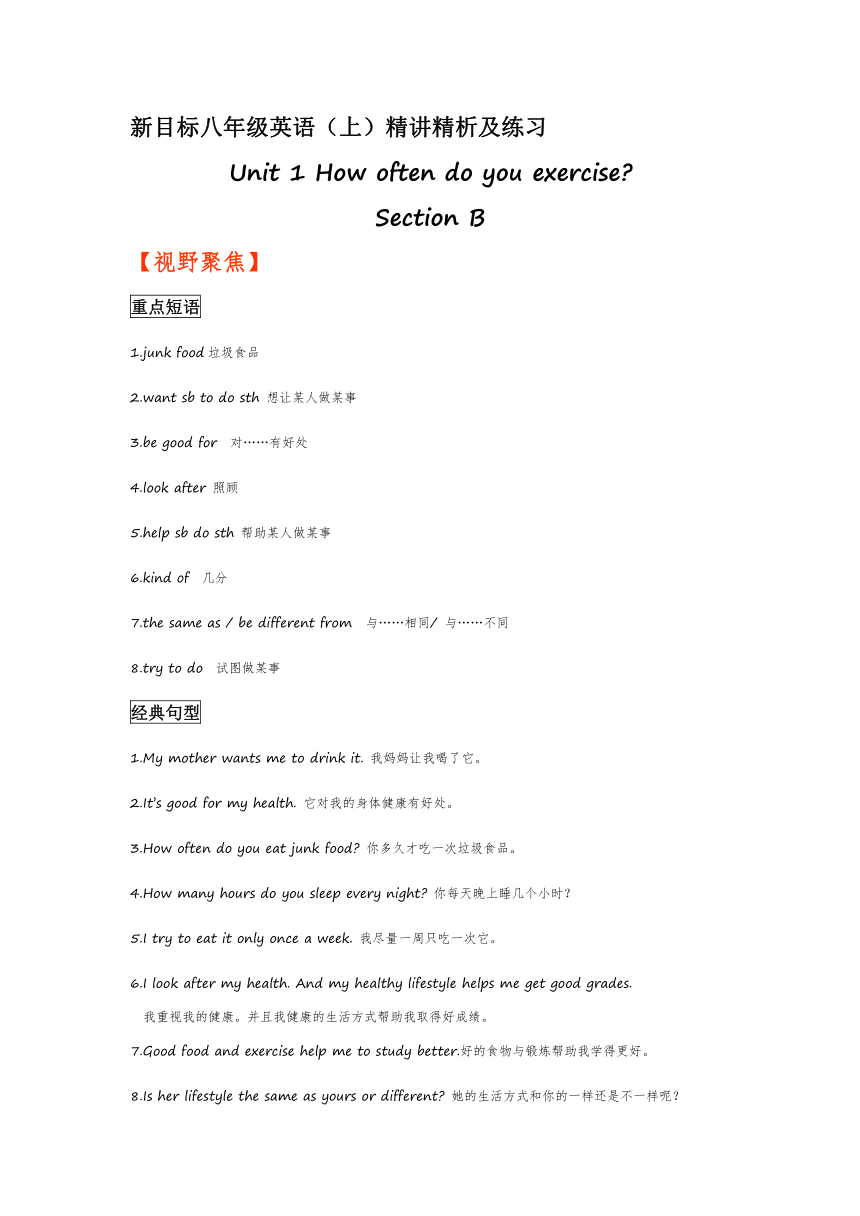
|
|
| 格式 | rar | ||
| 文件大小 | 16.8KB | ||
| 资源类型 | 教案 | ||
| 版本资源 | 人教新目标(Go for it)版 | ||
| 科目 | 英语 | ||
| 更新时间 | 2007-11-01 00:00:00 | ||
图片预览

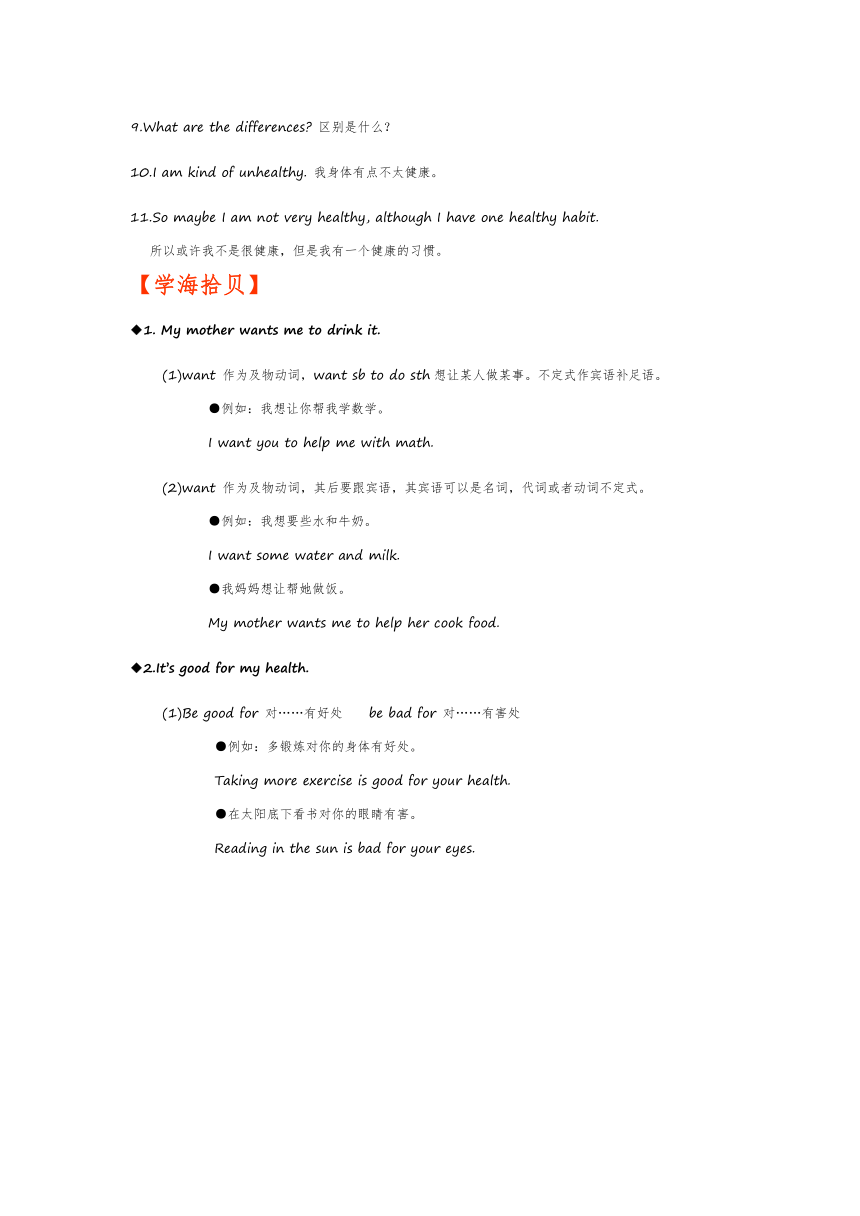
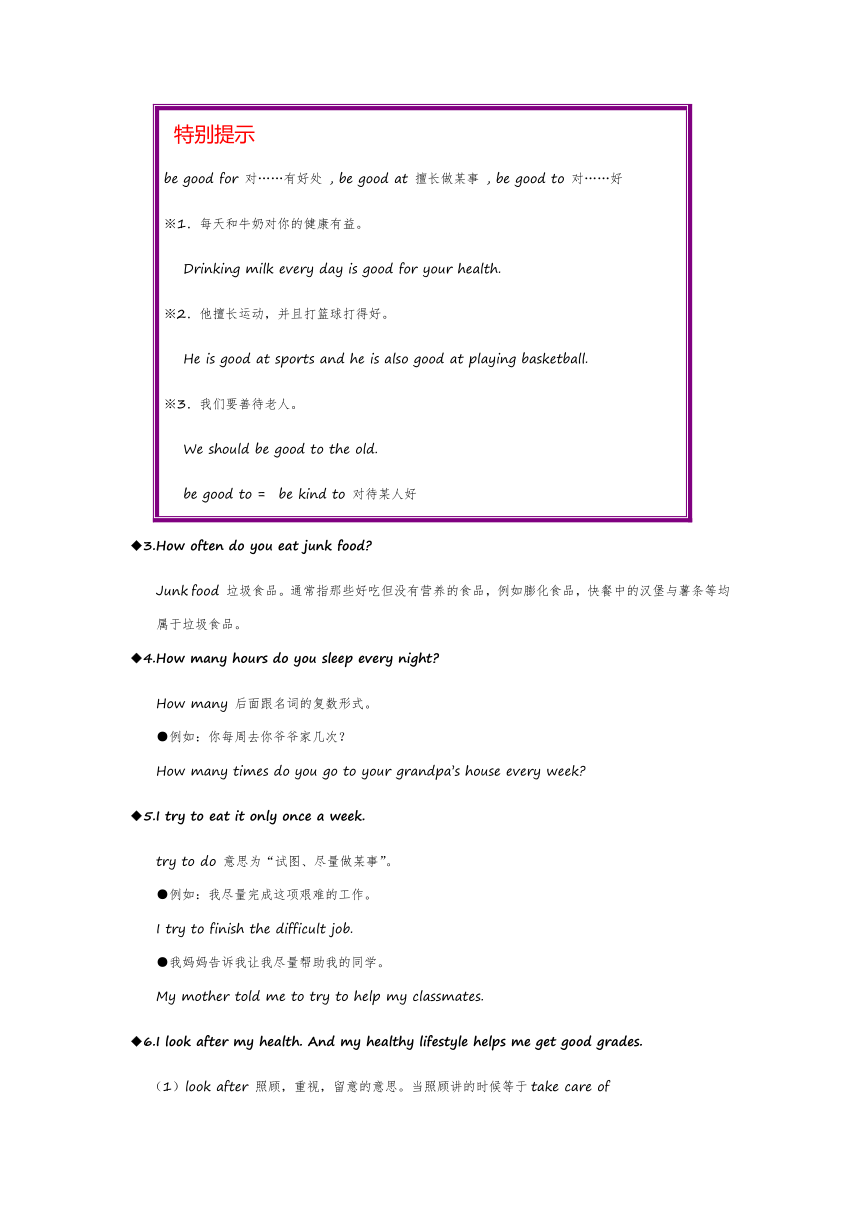
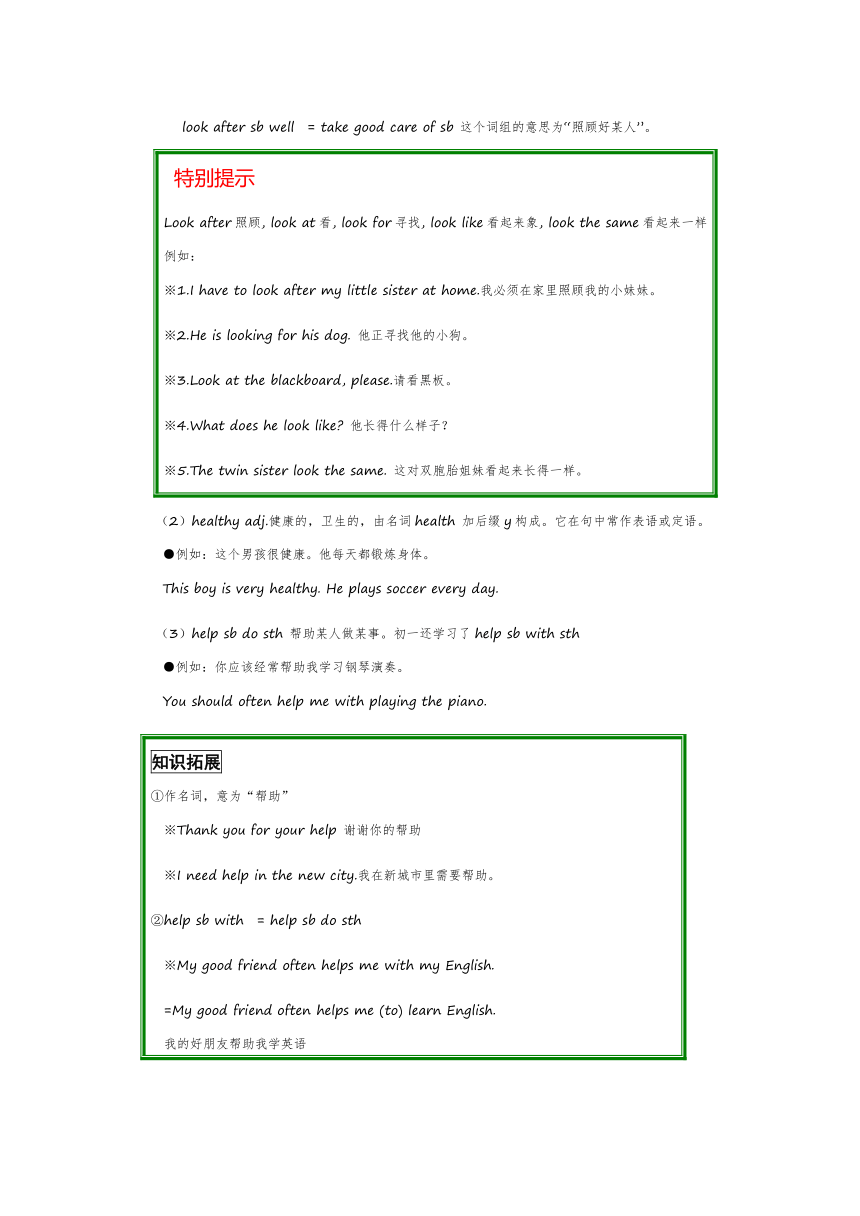
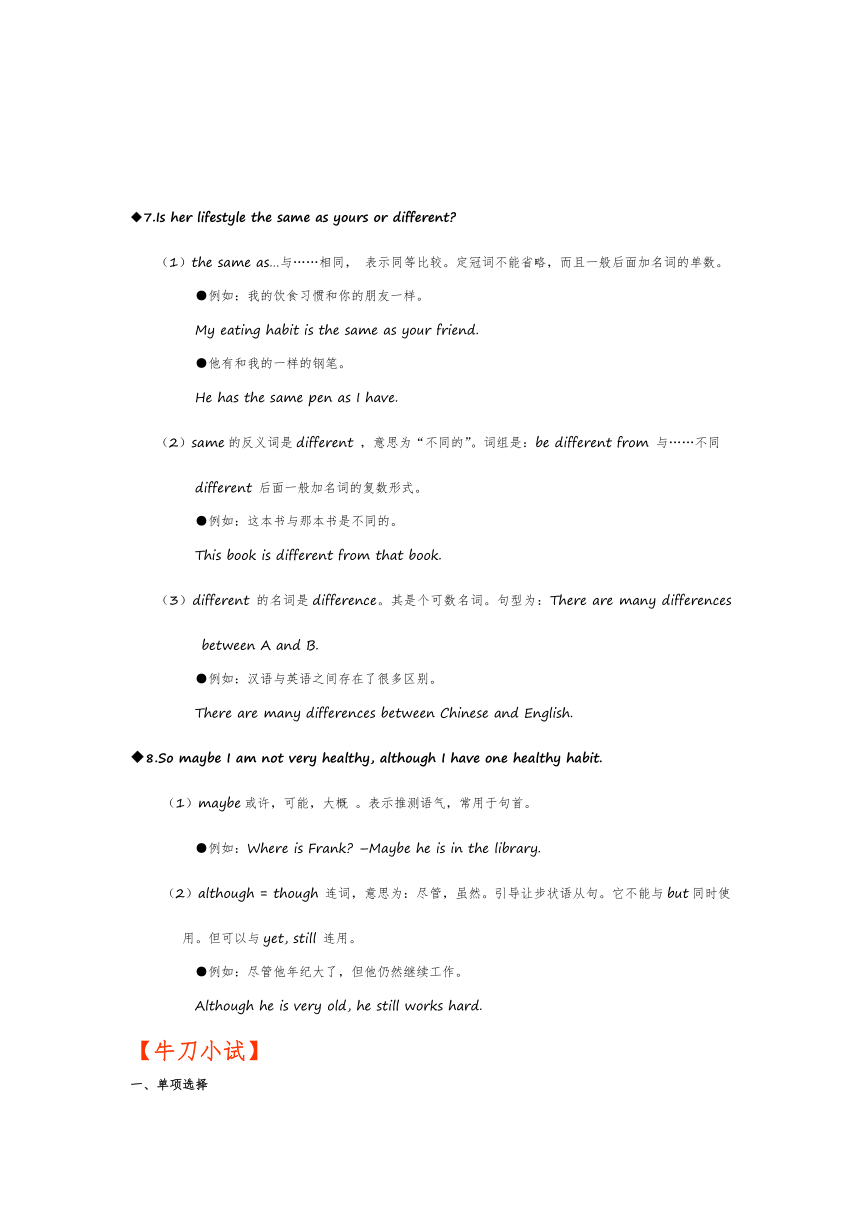
文档简介
新目标八年级英语(上)精讲精析及练习
Unit 1 How often do you exercise
Section B
【视野聚焦】
重点短语
1.junk food垃圾食品
2.want sb to do sth 想让某人做某事
3.be good for 对……有好处
4.look after 照顾
5.help sb do sth 帮助某人做某事
6.kind of 几分
7.the same as / be different from 与……相同/ 与……不同
8.try to do 试图做某事
经典句型
1.My mother wants me to drink it. 我妈妈让我喝了它。
2.It’s good for my health. 它对我的身体健康有好处。
3.How often do you eat junk food 你多久才吃一次垃圾食品。
4.How many hours do you sleep every night 你每天晚上睡几个小时?
5.I try to eat it only once a week. 我尽量一周只吃一次它。
6.I look after my health. And my healthy lifestyle helps me get good grades.
我重视我的健康。并且我健康的生活方式帮助我取得好成绩。
7.Good food and exercise help me to study better.好的食物与锻炼帮助我学得更好。
8.Is her lifestyle the same as yours or different 她的生活方式和你的一样还是不一样呢?
9.What are the differences 区别是什么?
10.I am kind of unhealthy. 我身体有点不太健康。
11.So maybe I am not very healthy, although I have one healthy habit.
所以或许我不是很健康,但是我有一个健康的习惯。
【学海拾贝】
◆1. My mother wants me to drink it.
(1)want 作为及物动词,want sb to do sth想让某人做某事。不定式作宾语补足语。
●例如:我想让你帮我学数学。
I want you to help me with math.
(2)want 作为及物动词,其后要跟宾语,其宾语可以是名词,代词或者动词不定式。
●例如:我想要些水和牛奶。
I want some water and milk.
●我妈妈想让帮她做饭。
My mother wants me to help her cook food.
◆2.It’s good for my health.
(1)Be good for 对……有好处 be bad for 对……有害处
●例如:多锻炼对你的身体有好处。
Taking more exercise is good for your health.
●在太阳底下看书对你的眼睛有害。
Reading in the sun is bad for your eyes.
特别提示be good for 对……有好处 , be good at 擅长做某事 , be good to 对……好※1.每天和牛奶对你的健康有益。 Drinking milk every day is good for your health.※2.他擅长运动,并且打篮球打得好。 He is good at sports and he is also good at playing basketball.※3.我们要善待老人。 We should be good to the old. be good to = be kind to 对待某人好
◆3.How often do you eat junk food
Junk food 垃圾食品。通常指那些好吃但没有营养的食品,例如膨化食品,快餐中的汉堡与薯条等均属于垃圾食品。
◆4.How many hours do you sleep every night
How many 后面跟名词的复数形式。
●例如:你每周去你爷爷家几次?
How many times do you go to your grandpa’s house every week
◆5.I try to eat it only once a week.
try to do 意思为“试图、尽量做某事”。
●例如:我尽量完成这项艰难的工作。
I try to finish the difficult job.
●我妈妈告诉我让我尽量帮助我的同学。
My mother told me to try to help my classmates.
◆6.I look after my health. And my healthy lifestyle helps me get good grades.
(1)look after 照顾,重视,留意的意思。当照顾讲的时候等于take care of
look after sb well = take good care of sb 这个词组的意思为“照顾好某人”。
特别提示Look after照顾, look at看, look for寻找, look like看起来象, look the same看起来一样例如:※1.I have to look after my little sister at home.我必须在家里照顾我的小妹妹。※2.He is looking for his dog. 他正寻找他的小狗。※3.Look at the blackboard, please.请看黑板。※4.What does he look like 他长得什么样子?※5.The twin sister look the same. 这对双胞胎姐妹看起来长得一样。
(2)healthy adj.健康的,卫生的,由名词health 加后缀y构成。它在句中常作表语或定语。
●例如:这个男孩很健康。他每天都锻炼身体。
This boy is very healthy. He plays soccer every day.
(3)help sb do sth 帮助某人做某事。初一还学习了help sb with sth
●例如:你应该经常帮助我学习钢琴演奏。
You should often help me with playing the piano.
知识拓展①作名词,意为“帮助” ※Thank you for your help 谢谢你的帮助 ※I need help in the new city.我在新城市里需要帮助。②help sb with = help sb do sth ※My good friend often helps me with my English. =My good friend often helps me (to) learn English. 我的好朋友帮助我学英语
◆7.Is her lifestyle the same as yours or different
(1)the same as…与……相同, 表示同等比较。定冠词不能省略,而且一般后面加名词的单数。
●例如:我的饮食习惯和你的朋友一样。
My eating habit is the same as your friend.
●他有和我的一样的钢笔。
He has the same pen as I have.
(2)same的反义词是different ,意思为“不同的”。词组是:be different from 与……不同
different 后面一般加名词的复数形式。
●例如:这本书与那本书是不同的。
This book is different from that book.
(3)different 的名词是difference。其是个可数名词。句型为:There are many differences between A and B.
●例如:汉语与英语之间存在了很多区别。
There are many differences between Chinese and English.
◆8.So maybe I am not very healthy, although I have one healthy habit.
(1)maybe或许,可能,大概 。表示推测语气,常用于句首。
●例如:Where is Frank –Maybe he is in the library.
(2)although = though 连词,意思为:尽管,虽然。引导让步状语从句。它不能与but同时使用。但可以与yet, still 连用。
●例如:尽管他年纪大了,但他仍然继续工作。
Although he is very old, he still works hard.
【牛刀小试】
一、单项选择
( )1.He tries _____ English well, because it’s important.
A. learn B. learning C. to learn D. learns
( )2.The doctor wants me ________ milk for breakfast every day.
A. get B. to drink C. to buy D. have
( )3.Getting up early and going to bed early _________your health.
A. is good for B. is good to C. is good at D. is bad for
( )4.Can you help me _____my room
A. clean B. cleaning C. to cleaning D. cleaned
( )5.Mary has the same hair color _________her favorite pop star.
A. as B. with C. of D. like
( )6.Eating too much junk food is an _______habit.
A. healthy B. unhealthy C. interesting D. important
( )7._____do you watch TV at one time –Two or three.
A. How much B. How many hours C. How often D. What time
( )8.Let’s talk about the _____between English and Chinese.
A. difference B. different C. differents D. differences
( )9.He is ______fat because he eats_____food.
A. much too, too much B. too much; much too
C. too much; too much D. much too, much too
( )10.Good _____and _______ help her to study.
A. foods; exercise B. foods; exercises C. food; exercise D. food. Exercises
二、词语填空
1.__________(take) exercise every day is good for your _________(health).
2.My mother want s me ___________(drink) milk.
3.My eating __________(habit) are pretty good.
4.Tina is kind of _________(health). She doesn’t like sports.
5.I can _________(hard) hear you, please say it loudly.
6.He has been to Shanghai ____________(two).
7.What do you ___________(usual) do on Sundays
8.Do you find the ______________(different) between the twins
9.He tries __________(be) a good student.
10.I have a lot homework __________(do) this evening.
三、句型转换
1.try, must, less, eat, to, meat, you (连词组句)
__________________________________________________________________
2.He is ill, but he goes to help the old people. (改写句子使句意相同)
=__________ he is ill, he goes to help the old people.
3.Can you look after my little dog (改写句子使句意相同)
= Can you ________ __________ __________my little dog
4.Pandas are a little interesting. (改写句子使句意相同)
=Pandas are _________ _________interesting.
5.Most students watch TV every day.(改为否定句)
①__________ students watch TV every day.
②______ _______the students watch TV every day. (改为同义句)
四、翻译句子
1、做眼保健操对你的眼睛有好处。
Doing eye exercises ____________ _____________ __________your eyes.
2、我们尽量准时到达学校。
We __________ _________get to school on time.
3、散步有助于保持身体健康。
Walking helps to keep __________ __________ ___________.
4、你每天学习几个小时?
_________ ________ _________ ________you study every day
5、王老师想要我帮助李文学数学。
Miss Wang _________me __________help Li Wen _________math.
【超越自我】
( )1.Thank you for _____my grandpa when I was away.(2005,陕西)
A. looking after B. look over C. looking at D. look for
( )2.Robert does well in playing table tennis. (2005年,宁德)
A. is good at B. is interested in C. likes D. hates.
( )3.—I like my teacher. He is very kind ____us. –Oh. That’s very kind _____him.(2005,辽宁)
A. of, to B. to, of C. to, to D. of, of
( )4.Is the weather ____in different parts of Australia
—No, it’s quite different. (2005,安徽芜湖)
A. like B. different C. the same D. same
( )5.My mother often tells me____ my classmates when they want. (2004,山东潍坊)
A. help B. to help C. helping D. helps
【创新全解】
牛刀小试版块答案:
一、1~5 CBAAA 6~10 BBDAC
二、1.Taking, health 2. to drink 3. habits 4. healthy 5. hardly 6. twice 7. usually 8. differences 9. to be 10. to do
三、1.You must try to eat less meat. 2.Although 3. take care of 4. kind of 5.① No ② Most of
四、翻译句子good for 2. try to 3. is good health 4. How many hours do 5. wants to with
超越自我答案
1.A(thank you for doing sth .感谢你做某事情,look after 的意思是照顾某人)
2.A(do well in 是擅长做某事,它的同义词组是 be good at)
3.A(be kind of 意思为“某人真好”be kind to sb意思为“对某人好”)
4.C(与……相同应该使用the same 一词,题中的意思是:在澳大利亚的不同地区天气一样吗?)
5.B(tell sb to do sth 告诉某人做某事)
Self check
【视野聚焦】
重点短语
1.keep in good health 保持身体健康
2.eat less food 吃更少的食物
3.have a healthy lifestyle. 拥有一个健康的生活方式
经典句型
1.A lot of vegetables help you keep in good health.
2.You must try to eat less meat.
3.Do you have a healthy lifestyle
【学海拾贝】
◆1.A lot of vegetables help you keep in good health.
这里的keep in good health等于 keep healthy 保持身体健康的意思。 in good health健康 in bad health 不健康
●例如:这位老人有很好的饮食习惯,这有助于他保持健康。
This old man has good eating habits. It helps him keep in good health.
●我奶奶身体不好,我父母每周末去看她。
My grandma is in bad health. My parents go to see her on weekends.
◆2.You must try to eat less meat.
Less 更少的,较少的 , 是little 的比较级,用来修饰不可数名词,与more 相 对。
●例如:多运动,少吃饭,你将会变得更苗条和健康。
Take more exercise and eat less food and you will be thin and healthy.
【自我检测1参考答案】
1.wants 2.exercises 3.help 4. try 5. have
语法指导
(一)一般现在时:
1. 动词变化:一般现在时主要用动词原形表示,但第三人称单数后要加词尾-s,另外be和have有特殊的人称形式。
在加词尾-s时要注意:
情况 加法 例词
一般情况 加-s reads, writes, says
以ch, sh, s, x, 或o收尾的词 加-es teaches, washes, guesses, fixes, goes
以“辅音字母+y”结尾的词 变y为i再加-es try-triescarry-carries
读音:
情况 读法 例词
在[p][t][k][f]等清辅音后 [s] helps, hates, asks, laughs
在[s][z][][t][d]等音后 [iz] faces, rises, wishes, watches, urges
在其他情况下 [z] plans, cries, shows
2. 一般现在时主要表示:
(1)经常性或习惯性的动作,常与这样的时间状语连用:always, often, usually, sometimes等
eg: We always help each other.
It often snows in winter.
I get up early every morning.
(2)表示主语现在的特征、性格、能力等。
eg: He loves sports.
Jane is an outgoing girl.
Tom and Tim both have medium height.
(3)表示客观、普遍真理
eg:
Two and four makes six.
Water boils at 100℃
The moon moves round the earth.
3. 一般现在时的疑问句一般以在句首加助动词do,does的方式构成。第三人称单数加does,其他加do,这时动词一概用原形;动词be只需与主语位置对调就行了。
eg: Do you like English
Do they have story books
What does she do every evening
Is she at home
Are you good at English
4. 一般现在时的否定式是do not(don’t)或does not (doesn’t)+动词原形来构成的,be动词做谓语动词只需在be后加not构成否定。
eg:
I don’t like oranges at all.
She doesn’t work in the TV station.
They aren’t students.
I’m not busy every weekend.
(二)频度副词
1.频度副词的含义:频度副词是表示动作发生频率的词汇,常用的有:never, sometimes, usually, often, always等。它们表示的“差别”前面已讲过。
2.频度副词在句中的位置
(1)放在系动词、助动词或情态动词这后。
He is often late for school.他经常上学迟到。
He is always asking for money.他总是要钱。
I can never do it.我不能再做它了。
(2)放在行为动词前。
We often have lunch at home.我们经常在家吃午饭。
(3)有些频度副词可放在句首或句尾,用来表示强调。
He hasn’t been to USA very often.他不经常去美国。
(三)日常用语总结
1、询问周末活动的日常用语
(1)What do you usually do on weekends I usually play soccer.
(2)What do they do on weekends They often go to the movies.
(3)What does he do on weekends He sometimes plays the guitar.
2、询问事情发生频率的日常用语。
(1)How often do you shop I shop once a month.
(2)How often does he watch TV He watches TV twice a week.
Unit 1 How often do you exercise
Section B
【视野聚焦】
重点短语
1.junk food垃圾食品
2.want sb to do sth 想让某人做某事
3.be good for 对……有好处
4.look after 照顾
5.help sb do sth 帮助某人做某事
6.kind of 几分
7.the same as / be different from 与……相同/ 与……不同
8.try to do 试图做某事
经典句型
1.My mother wants me to drink it. 我妈妈让我喝了它。
2.It’s good for my health. 它对我的身体健康有好处。
3.How often do you eat junk food 你多久才吃一次垃圾食品。
4.How many hours do you sleep every night 你每天晚上睡几个小时?
5.I try to eat it only once a week. 我尽量一周只吃一次它。
6.I look after my health. And my healthy lifestyle helps me get good grades.
我重视我的健康。并且我健康的生活方式帮助我取得好成绩。
7.Good food and exercise help me to study better.好的食物与锻炼帮助我学得更好。
8.Is her lifestyle the same as yours or different 她的生活方式和你的一样还是不一样呢?
9.What are the differences 区别是什么?
10.I am kind of unhealthy. 我身体有点不太健康。
11.So maybe I am not very healthy, although I have one healthy habit.
所以或许我不是很健康,但是我有一个健康的习惯。
【学海拾贝】
◆1. My mother wants me to drink it.
(1)want 作为及物动词,want sb to do sth想让某人做某事。不定式作宾语补足语。
●例如:我想让你帮我学数学。
I want you to help me with math.
(2)want 作为及物动词,其后要跟宾语,其宾语可以是名词,代词或者动词不定式。
●例如:我想要些水和牛奶。
I want some water and milk.
●我妈妈想让帮她做饭。
My mother wants me to help her cook food.
◆2.It’s good for my health.
(1)Be good for 对……有好处 be bad for 对……有害处
●例如:多锻炼对你的身体有好处。
Taking more exercise is good for your health.
●在太阳底下看书对你的眼睛有害。
Reading in the sun is bad for your eyes.
特别提示be good for 对……有好处 , be good at 擅长做某事 , be good to 对……好※1.每天和牛奶对你的健康有益。 Drinking milk every day is good for your health.※2.他擅长运动,并且打篮球打得好。 He is good at sports and he is also good at playing basketball.※3.我们要善待老人。 We should be good to the old. be good to = be kind to 对待某人好
◆3.How often do you eat junk food
Junk food 垃圾食品。通常指那些好吃但没有营养的食品,例如膨化食品,快餐中的汉堡与薯条等均属于垃圾食品。
◆4.How many hours do you sleep every night
How many 后面跟名词的复数形式。
●例如:你每周去你爷爷家几次?
How many times do you go to your grandpa’s house every week
◆5.I try to eat it only once a week.
try to do 意思为“试图、尽量做某事”。
●例如:我尽量完成这项艰难的工作。
I try to finish the difficult job.
●我妈妈告诉我让我尽量帮助我的同学。
My mother told me to try to help my classmates.
◆6.I look after my health. And my healthy lifestyle helps me get good grades.
(1)look after 照顾,重视,留意的意思。当照顾讲的时候等于take care of
look after sb well = take good care of sb 这个词组的意思为“照顾好某人”。
特别提示Look after照顾, look at看, look for寻找, look like看起来象, look the same看起来一样例如:※1.I have to look after my little sister at home.我必须在家里照顾我的小妹妹。※2.He is looking for his dog. 他正寻找他的小狗。※3.Look at the blackboard, please.请看黑板。※4.What does he look like 他长得什么样子?※5.The twin sister look the same. 这对双胞胎姐妹看起来长得一样。
(2)healthy adj.健康的,卫生的,由名词health 加后缀y构成。它在句中常作表语或定语。
●例如:这个男孩很健康。他每天都锻炼身体。
This boy is very healthy. He plays soccer every day.
(3)help sb do sth 帮助某人做某事。初一还学习了help sb with sth
●例如:你应该经常帮助我学习钢琴演奏。
You should often help me with playing the piano.
知识拓展①作名词,意为“帮助” ※Thank you for your help 谢谢你的帮助 ※I need help in the new city.我在新城市里需要帮助。②help sb with = help sb do sth ※My good friend often helps me with my English. =My good friend often helps me (to) learn English. 我的好朋友帮助我学英语
◆7.Is her lifestyle the same as yours or different
(1)the same as…与……相同, 表示同等比较。定冠词不能省略,而且一般后面加名词的单数。
●例如:我的饮食习惯和你的朋友一样。
My eating habit is the same as your friend.
●他有和我的一样的钢笔。
He has the same pen as I have.
(2)same的反义词是different ,意思为“不同的”。词组是:be different from 与……不同
different 后面一般加名词的复数形式。
●例如:这本书与那本书是不同的。
This book is different from that book.
(3)different 的名词是difference。其是个可数名词。句型为:There are many differences between A and B.
●例如:汉语与英语之间存在了很多区别。
There are many differences between Chinese and English.
◆8.So maybe I am not very healthy, although I have one healthy habit.
(1)maybe或许,可能,大概 。表示推测语气,常用于句首。
●例如:Where is Frank –Maybe he is in the library.
(2)although = though 连词,意思为:尽管,虽然。引导让步状语从句。它不能与but同时使用。但可以与yet, still 连用。
●例如:尽管他年纪大了,但他仍然继续工作。
Although he is very old, he still works hard.
【牛刀小试】
一、单项选择
( )1.He tries _____ English well, because it’s important.
A. learn B. learning C. to learn D. learns
( )2.The doctor wants me ________ milk for breakfast every day.
A. get B. to drink C. to buy D. have
( )3.Getting up early and going to bed early _________your health.
A. is good for B. is good to C. is good at D. is bad for
( )4.Can you help me _____my room
A. clean B. cleaning C. to cleaning D. cleaned
( )5.Mary has the same hair color _________her favorite pop star.
A. as B. with C. of D. like
( )6.Eating too much junk food is an _______habit.
A. healthy B. unhealthy C. interesting D. important
( )7._____do you watch TV at one time –Two or three.
A. How much B. How many hours C. How often D. What time
( )8.Let’s talk about the _____between English and Chinese.
A. difference B. different C. differents D. differences
( )9.He is ______fat because he eats_____food.
A. much too, too much B. too much; much too
C. too much; too much D. much too, much too
( )10.Good _____and _______ help her to study.
A. foods; exercise B. foods; exercises C. food; exercise D. food. Exercises
二、词语填空
1.__________(take) exercise every day is good for your _________(health).
2.My mother want s me ___________(drink) milk.
3.My eating __________(habit) are pretty good.
4.Tina is kind of _________(health). She doesn’t like sports.
5.I can _________(hard) hear you, please say it loudly.
6.He has been to Shanghai ____________(two).
7.What do you ___________(usual) do on Sundays
8.Do you find the ______________(different) between the twins
9.He tries __________(be) a good student.
10.I have a lot homework __________(do) this evening.
三、句型转换
1.try, must, less, eat, to, meat, you (连词组句)
__________________________________________________________________
2.He is ill, but he goes to help the old people. (改写句子使句意相同)
=__________ he is ill, he goes to help the old people.
3.Can you look after my little dog (改写句子使句意相同)
= Can you ________ __________ __________my little dog
4.Pandas are a little interesting. (改写句子使句意相同)
=Pandas are _________ _________interesting.
5.Most students watch TV every day.(改为否定句)
①__________ students watch TV every day.
②______ _______the students watch TV every day. (改为同义句)
四、翻译句子
1、做眼保健操对你的眼睛有好处。
Doing eye exercises ____________ _____________ __________your eyes.
2、我们尽量准时到达学校。
We __________ _________get to school on time.
3、散步有助于保持身体健康。
Walking helps to keep __________ __________ ___________.
4、你每天学习几个小时?
_________ ________ _________ ________you study every day
5、王老师想要我帮助李文学数学。
Miss Wang _________me __________help Li Wen _________math.
【超越自我】
( )1.Thank you for _____my grandpa when I was away.(2005,陕西)
A. looking after B. look over C. looking at D. look for
( )2.Robert does well in playing table tennis. (2005年,宁德)
A. is good at B. is interested in C. likes D. hates.
( )3.—I like my teacher. He is very kind ____us. –Oh. That’s very kind _____him.(2005,辽宁)
A. of, to B. to, of C. to, to D. of, of
( )4.Is the weather ____in different parts of Australia
—No, it’s quite different. (2005,安徽芜湖)
A. like B. different C. the same D. same
( )5.My mother often tells me____ my classmates when they want. (2004,山东潍坊)
A. help B. to help C. helping D. helps
【创新全解】
牛刀小试版块答案:
一、1~5 CBAAA 6~10 BBDAC
二、1.Taking, health 2. to drink 3. habits 4. healthy 5. hardly 6. twice 7. usually 8. differences 9. to be 10. to do
三、1.You must try to eat less meat. 2.Although 3. take care of 4. kind of 5.① No ② Most of
四、翻译句子good for 2. try to 3. is good health 4. How many hours do 5. wants to with
超越自我答案
1.A(thank you for doing sth .感谢你做某事情,look after 的意思是照顾某人)
2.A(do well in 是擅长做某事,它的同义词组是 be good at)
3.A(be kind of 意思为“某人真好”be kind to sb意思为“对某人好”)
4.C(与……相同应该使用the same 一词,题中的意思是:在澳大利亚的不同地区天气一样吗?)
5.B(tell sb to do sth 告诉某人做某事)
Self check
【视野聚焦】
重点短语
1.keep in good health 保持身体健康
2.eat less food 吃更少的食物
3.have a healthy lifestyle. 拥有一个健康的生活方式
经典句型
1.A lot of vegetables help you keep in good health.
2.You must try to eat less meat.
3.Do you have a healthy lifestyle
【学海拾贝】
◆1.A lot of vegetables help you keep in good health.
这里的keep in good health等于 keep healthy 保持身体健康的意思。 in good health健康 in bad health 不健康
●例如:这位老人有很好的饮食习惯,这有助于他保持健康。
This old man has good eating habits. It helps him keep in good health.
●我奶奶身体不好,我父母每周末去看她。
My grandma is in bad health. My parents go to see her on weekends.
◆2.You must try to eat less meat.
Less 更少的,较少的 , 是little 的比较级,用来修饰不可数名词,与more 相 对。
●例如:多运动,少吃饭,你将会变得更苗条和健康。
Take more exercise and eat less food and you will be thin and healthy.
【自我检测1参考答案】
1.wants 2.exercises 3.help 4. try 5. have
语法指导
(一)一般现在时:
1. 动词变化:一般现在时主要用动词原形表示,但第三人称单数后要加词尾-s,另外be和have有特殊的人称形式。
在加词尾-s时要注意:
情况 加法 例词
一般情况 加-s reads, writes, says
以ch, sh, s, x, 或o收尾的词 加-es teaches, washes, guesses, fixes, goes
以“辅音字母+y”结尾的词 变y为i再加-es try-triescarry-carries
读音:
情况 读法 例词
在[p][t][k][f]等清辅音后 [s] helps, hates, asks, laughs
在[s][z][][t][d]等音后 [iz] faces, rises, wishes, watches, urges
在其他情况下 [z] plans, cries, shows
2. 一般现在时主要表示:
(1)经常性或习惯性的动作,常与这样的时间状语连用:always, often, usually, sometimes等
eg: We always help each other.
It often snows in winter.
I get up early every morning.
(2)表示主语现在的特征、性格、能力等。
eg: He loves sports.
Jane is an outgoing girl.
Tom and Tim both have medium height.
(3)表示客观、普遍真理
eg:
Two and four makes six.
Water boils at 100℃
The moon moves round the earth.
3. 一般现在时的疑问句一般以在句首加助动词do,does的方式构成。第三人称单数加does,其他加do,这时动词一概用原形;动词be只需与主语位置对调就行了。
eg: Do you like English
Do they have story books
What does she do every evening
Is she at home
Are you good at English
4. 一般现在时的否定式是do not(don’t)或does not (doesn’t)+动词原形来构成的,be动词做谓语动词只需在be后加not构成否定。
eg:
I don’t like oranges at all.
She doesn’t work in the TV station.
They aren’t students.
I’m not busy every weekend.
(二)频度副词
1.频度副词的含义:频度副词是表示动作发生频率的词汇,常用的有:never, sometimes, usually, often, always等。它们表示的“差别”前面已讲过。
2.频度副词在句中的位置
(1)放在系动词、助动词或情态动词这后。
He is often late for school.他经常上学迟到。
He is always asking for money.他总是要钱。
I can never do it.我不能再做它了。
(2)放在行为动词前。
We often have lunch at home.我们经常在家吃午饭。
(3)有些频度副词可放在句首或句尾,用来表示强调。
He hasn’t been to USA very often.他不经常去美国。
(三)日常用语总结
1、询问周末活动的日常用语
(1)What do you usually do on weekends I usually play soccer.
(2)What do they do on weekends They often go to the movies.
(3)What does he do on weekends He sometimes plays the guitar.
2、询问事情发生频率的日常用语。
(1)How often do you shop I shop once a month.
(2)How often does he watch TV He watches TV twice a week.
同课章节目录
- Unit 1 Where did you go on vacation?
- Section A
- Section B
- Unit 2 How often do you exercise?
- Section A
- Section B
- Unit 3 I'm more outgoing than my sister.
- Section A
- Section B
- Unit 4 What's the best movie theater?
- Section A
- Section B
- Unit 5 Do you want to watch a game show?
- Section A
- Section B
- Unit 6 I'm going to study computer science.
- Section A
- Section B
- Unit 7 Will people have robots?
- Section A
- Section B
- Unit 8 How do you make a banana milk shake?
- Section A
- Section B
- Unit 9 Can you come to my party?
- Section A
- Section B
- Unit 10 If you go to the party, you'll have a grea
- Section A
- Section B
